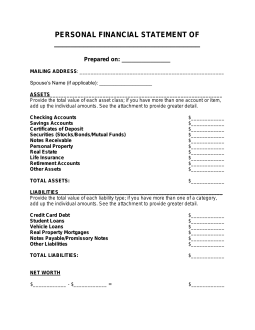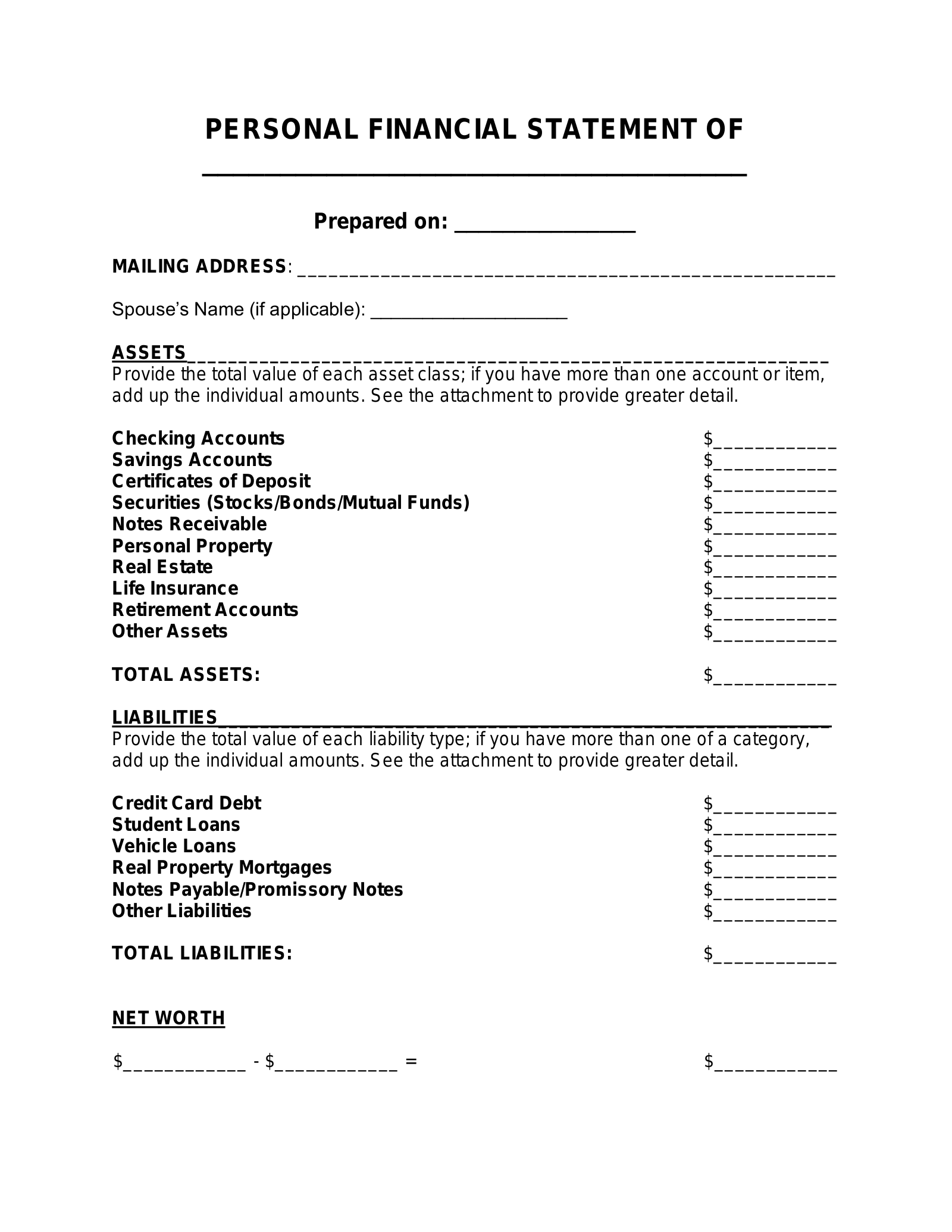Updated October 11, 2023
A personal financial statement is a document summarizing a person’s financial standing. It provides a full list of their personal assets and liabilities as well as their income and expenses. Commonly required by financial institutions when applying for credit or a loan, it demonstrates a person’s creditworthiness and repayment ability.
Common Uses
- Credit, loan, or financing application (mortgage, vehicle, etc.)
- Seeking financing from an investor
- Application for a lease
- Financial planning
Table of Contents |
What is a Personal Financial Statement?
A personal financial statement is an overview of a person’s financial situation at a given time. It includes a list of their assets, liabilities, income, and expenses to calculate the person’s net worth and monthly profit/loss.
How to Prepare a Financial Statement
A financial statement is comprised of two parts: a balance sheet (assets and liabilities) and an income statement (monthly income and expenses).
What to Include (6)
To create an accurate, up-to-date financial statement, be sure to collect a list of all assets, liabilities, income, and expenses with their estimated cash values.
1. Assets
Assets are physical or digital goods with monetary value. Examples include:
- Bank accounts (checking, savings, money market accounts)
- Investment accounts: Stocks, ETFs, mutual funds, bonds, commodities
- Retirement accounts: 401(k), IRA, etc.
- Certificate of deposit
- Physical cash
- Real estate
- Personal properties with significant value: Vehicles, boats, collectibles, jewelry
2. Liabilities
Liabilities are debts and financial obligations that a person is tied to. Examples include:
- Credit cards with a balance
- Student loans
- Unpaid medical bills or taxes
- Mortgages or vehicle loans
- Co-signed loans
3. Net worth
A person’s net worth represents their monetary value after their liabilities have been accounted for.
[Total Value of Assets ($) – Total Value of Liabilities ($) = Net Worth ($)]
4. Income
Income represents all the positive cash flow coming in. Examples include:
- Monthly wages
- Bonuses
- Commissions
- Passive income: Dividends, interest on savings account, etc.
5. Expenses
Expenses represent the cost of living and other negative cash flows. Examples include:
- Monthly rent
- Car payments
- Student loan payments
- Utilities
- Other living expenses
6. Net profit/loss
A person’s net profit or loss is calculated by comparing the incoming cash flow with the outgoing cash flow.
[Total Sum of Income ($) – Total Sum of Expenses ($) = Net Profit/Loss ($)]
What Not to Include
- Business assets and liabilities — A personal financial statement should not include business-related assets and liabilities unless the person is directly liable.
- Loaned assets — If the person does not have legal ownership over an item, it should not be included in their personal financial statement.
- Personal home goods like furniture — Items without significant cash value or items that may not be easily sellable should not be included.
Sample
PERSONAL FINANCIAL STATEMENT OF [NAME]
Prepared on: [DATE]
MAILING ADDRESS: [MAILING ADDRESS]]
Spouse’s Name (if applicable): [[DATE]
ASSETS______________________________________________________________
Provide the total value of each asset class; if you have more than one account or item, add up the individual amounts. See the attachment to provide greater detail.
Checking Accounts [AMOUNT AVAILABLE]
Savings Accounts [AMOUNT AVAILABLE]
Certificates of Deposit [AMOUNT AVAILABLE]
Securities (Stocks/Bonds/Mutual Funds) [TOTAL VALUE]
Notes Receivable [TOTAL VALUE]
Personal Property [TOTAL VALUE]
Real Estate [TOTAL VALUE]
Life Insurance [SURRENDER VALUE]
Retirement Accounts [TOTAL VALUE]
Other Assets [TOTAL VALUE]
TOTAL ASSETS: [SUM OF ALL ASSETS]
LIABILITIES___________________________________________________________
Provide the total value of each liability type; if you have more than one of a category, add up the individual amounts. See the attachment to provide greater detail.
Credit Card Debt [TOTAL OWED]
Student Loans [TOTAL OWED]
Vehicle Loans [TOTAL OWED]
Real Property Mortgages [TOTAL OWED]
Notes Payable/Promissory Notes [TOTAL OWED]
Other Liabilities [TOTAL OWED]
TOTAL LIABILITIES: [SUM OF ALL LIABILITIES]
NET WORTH
[SUM OF ALL ASSETS] – [SUM OF ALL LIABILITIES] = [NET WORTH]
CERTIFICATION
I certify that the information contained in this statement is true and accurate to the best of my knowledge on the date indicated. I agree that, if after submitting this statement, there are any material changes to my finances that would impact the information it contains, I have an affirmative duty to alert the person or entity receiving this statement as soon as possible. I acknowledge that, as a result of submitting this statement, further inquiries, including a credit report, may be necessary to verify the information contained, and I hereby authorize the person or entity receiving those statements to make such inquiries.
Signature: _______________________________ Date: ______________
Print Name: _______________________________


